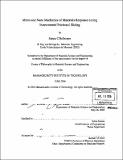Micro and nano mechanics of materials response during instrumented frictional sliding
Author(s)
Bellemare, Simon C. (Simon Claude)
DownloadFull printable version (13.71Mb)
Other Contributors
Massachusetts Institute of Technology. Dept. of Materials Science and Engineering.
Advisor
Subra Suresh.
Terms of use
Metadata
Show full item recordAbstract
Over the past decade, many computational studies have explored the mechanics of instrumented normal indentation. In contrast, very few studies have investigated quantitative aspects of frictional sliding contact in the elasto-plastic regime. In this thesis, a new framework was developed to establish relationships between the frictional sliding response, material properties and contact parameters. Dimensional analysis enabled to define scaling variables and dimensionless functions. Finite element methods were used to simulate the process of steady-state frictional sliding and evaluate the dimensionless functions. In frictional sliding, the representative plastic strain was found to be more than four times as large as in normal indentation. Further comparison with indentation indicated a three fold increase in the maximum pile-up height and an increased influence of the strain hardening on hardness. Experimental studies were conducted with and without a liquid lubricant in selected material systems. Quantitative agreements with numerical predictions were observed in all cases. The strong influence of the strain hardening exponent on the pile-up height was illustrated from frictional sliding results obtained in copper and copper-zinc specimens of different grain sizes. (cont.) Also, the influence of hardening characteristics was illustrated by preparing two microstructures of an aluminum alloy to have the same indentation hardness. These materials with same indentation hardness showed significantly different hardness and pile-up in frictional sliding. Experiments were also carried out on nanocrystalline nickel and alloys of different grain sizes. The addition of tungsten did not change significantly the strain hardening behavior of nanocrystalline nickel but it did stabilize significantly the microstructure in repeated pass experiments. A reverse algorithm was developed to extract plastic flow properties from the frictional sliding response. This algorithm uses the scratch hardness and pile-up measurements to estimate yield strength and strain hardening exponent. Based on sensitivity analysis, the accuracy on these estimates is significantly improved as compared to reverse algorithms for instrumented indentation, especially for the strain hardening exponent. Frictional sliding is an alternative or complement to instrumented indentation. It can provide a different ranking of materials for their tribological resistance. It can also be used to estimate plastic flow properties.
Description
Thesis (Ph. D.)--Massachusetts Institute of Technology, Dept. of Materials Science and Engineering, 2006. Includes bibliographical references.
Date issued
2006Department
Massachusetts Institute of Technology. Department of Materials Science and EngineeringPublisher
Massachusetts Institute of Technology
Keywords
Materials Science and Engineering.